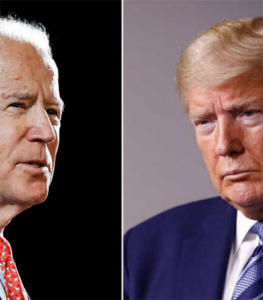Americans divided over racial justice, immigration and COVID – study finds
Americans are more dived than ever on issues around migration, racial justice and international engagement, according to a new study.
In his first speech as president-elect, Joe Biden promised to work to bridge the deep and bitter divisions in American society but research by the Pew Centre has found it may be a struggle.
 The Pew Centre has found “increasingly stark disagreement between Democrats and Republicans on the economy, racial justice, climate change, law enforcement, international engagement, COVID measures and a long list of other issues”.
The Pew Centre has found “increasingly stark disagreement between Democrats and Republicans on the economy, racial justice, climate change, law enforcement, international engagement, COVID measures and a long list of other issues”.
The report says the 2020 presidential election further deepened these divides.
“Supporters of Biden and Donald Trump believe the differences between them are about more than just politics and policies,” the authors say.
“A month before the election, roughly eight-in-ten registered voters in both camps said their differences with the other side were about core American values and roughly nine-in-ten – again in both camps – worried that a victory by the other would lead to lasting harm,” they say.
The report says the US is not only country wrestling with deepening political fissures pointing to how Brexit has polarised British politics and the rise of populist parties across Europe.
But the Pew Centre report says the 2020 COVID pandemic has exposed a deep divide in American politics is relative to other nations.
“Over the summer, 76 per cent of Republicans, including independents who lean to the party, felt the US had done a good job dealing with the coronavirus outbreak, , compared with just 29 per cent of those who do not identify with the Republican Party,” the report said.
This 47 percentage point gap was the largest gap found between those who support the governing party and those who do not across 14 nations surveyed. And 77 per cent of Americans said the country was now more divided than before the outbreak, as compared with a median of 47 per cent in the 13 other nations surveyed.
The report said divisions between the two parties have intensified over time as various types of identities have become “stacked” on top of people’s partisan identities.
“Race, religion and ideology now align with partisan identity in ways that they often didn’t in eras when the two parties were relatively heterogeneous coalitions,’ the report said.
It said much of the divide preceded the coronavirus and that Americans were more ideologically divided than any of the 19 other populations surveyed when asked how much they trusted scientists.
Democrats and Republicans differ over mask wearing, contact tracing, how well public health officials are dealing with the crisis and whether to get a vaccine.
“For Biden supporters, the coronavirus outbreak was a central issue in the election. 82 per cent said it was very important to their vote. Among Trump supporters, it was easily the least significant among six issues tested on the survey: Just 24 per cent said it was very important,” the report said.
The authors say the reason for the divide may be because 0f the polarising pressures of partisan media, social media, and even deeply rooted cultural, historical and regional divides.
But they say “America’s relatively rigid, two-party electoral system stands apart (from other countries) by collapsing a wide range of legitimate social and political debates into a singular battle line that can make our differences appear even larger than they may actually be”.
“And when the balance of support for these political parties is close enough for either to gain near-term electoral advantage – as it has in the US for more than a quarter of a century – the competition becomes cutthroat and politics begins to feel zero-sum, where one side’s gain is inherently the other’s loss,” the authors say.
But most Americans see the divisiveness as a problem and want to address it.
“Overwhelming majorities of both Trump (86 per cent) and Biden (89 per cent) supporters surveyed said that their preferred candidate, if elected, should focus on addressing the needs of all Americans, even if it means disappointing some of his supporters,” the report said.
In his speech, President-elect Biden vowed to “work as hard for those who didn’t vote for me as those who did” and called on “this grim era of demonization in America” to come to an end.
The researchers say this sentiment that resonates with Americans on both sides of the fence.
“But good intentions on the part of our leaders and ourselves face serious headwinds in a political system that reinforces a two-party political battleground at nearly every level,” they say.












